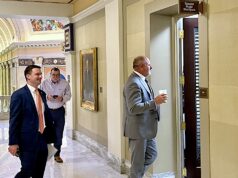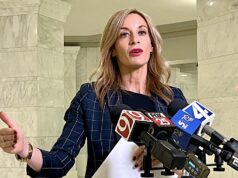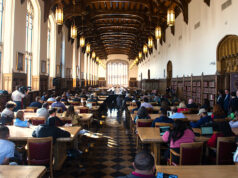(Editor’s note: This story was authored by Trevor Brown of Oklahoma Watch and appears here in accordance with the non-profit journalism organization’s republishing terms.)
For the first time since they officially declared for the race, six of the 10 candidates vying for the GOP’s gubernatorial nomination came together Monday for a forum hosted by The Oklahoman.
The six tackled issues ranging from abortion rights to wind taxes as they tried to convince prospective voters watching in person at the Oklahoma City Museum of Art or at home watching the live feed why they should receive their support.
Here are some of the takeaways from the debate:
Tax increases
Only two of the candidates – former Oklahoma City Mayor Mick Cornett and State Auditor and Inspector Gary Jones – voiced support for the tax package the Legislature passed last month to fund teacher raises.
Jones said he would have signed the bill if he were governor. He took credit for crafting the plan, which raised tobacco, motor fuel and oil and gas taxes, and for bringing together Democratic and Republican lawmakers to get it passed.
“It was my plan,” he said.
Cornett gave more lukewarm support, saying, “I’m glad the governor signed it,” before calling on the state to diversify its economy and pursue reforms to avoid future budget problems.
The other four candidates – Lt. Gov. Todd Lamb, former U.S. Attorney Gary Richardson, businessman Kevin Stitt and former state lawmaker Dan Fisher – said they back reforms and would identify waste before raising taxes.
Lamb went as far as to say that raising the gross production tax on oil and gas was “an ill-advised move” that will hurt the state in the long run.
Social issues
Fisher, who has made abolishing abortion a main campaign issue, unsurprisingly said he would push for anti-abortion legislation even if it means crossing the U.S. Supreme Court.
“When the laws of man come into conflict with the laws of God, we have a higher law that we must respond to,” he said. “The Supreme Court is not infallible; it is not God.”
Richardson joined him in heating up rhetoric on the issue. Richardson said he supports trying to change Roe vs. Wade if there is a “legal mechanism.” But, he said, “If it comes to a place where there is no legal way, then we take up arms and do what we need to do.”
Lamb added he would bring a “biblical world view” to the governor’s office and would always defend the “unborn”, while Stitt said he would do “whatever he can as governor” to advance the view that life begins at conception.
But not all seemed to want abortion to be a signature issue.
Cornett indicated it might not be a priority for his administration.
“I want them to know I won’t disappoint them as governor,” he said of abortion opponents. “But we have other issues we need to concentrate on as well.”
Jones joined him in saying that all the candidates on the stage are “pro life.” But instead of talking about legislation to restrict abortions, he said the state needs to provide alternatives, such as pouring more money into the foster-care system.”
Criminal justice reform
One question that elicited similar answers from the candidates was how they would approach criminal justice reform.
All six supported, to varying degrees, legislation that seeks to lower the state’s incarceration rate. Most candidates tied the issue to fiscal conservatism, citing the cost of jailing offenders, particularly those convicted of nonviolent crimes.
Lamb Asserts independence from Fallin
Despite working steps away from Gov. Mary Fallin on the second floor of the Capitol for the past eight years, Lamb continued to separate himself from the term-limited governor.
He said one of the highlights of the last four years was when he quit Fallin’s cabinet to protest a 2017 plan to increase sales taxes on dozens of services. He additionally said there has been “no clear-cut vision” during the past few years.
“Let me just take a moment to pause and remind everyone that the governor and lieutenant governor are entirely autonomous,” he said. “Don’t you forget that.”





















